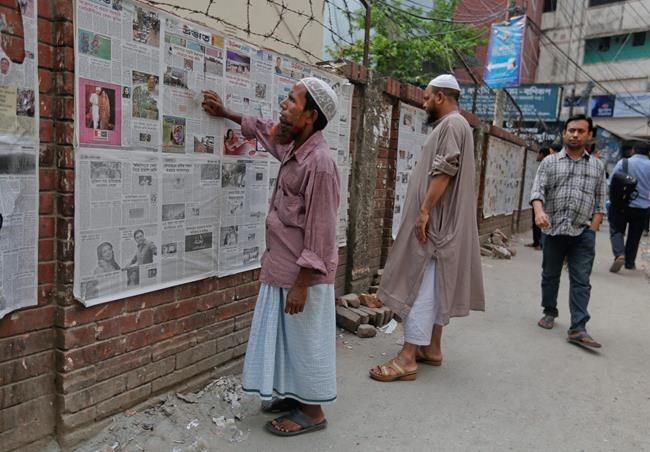
Bangladeshi men read about the execution of Jamaat-e-Islami party chief Motiur Motiur Rahman Nizami, on newspapers, pasted on a wall at an alley in Dhaka, Bangladesh, Wednesday, May 11, 2016. The head of Bangladesh's largest Islamist party was executed early Wednesday for his role in acts of genocide and war crimes during the country's independence war against Pakistan in 1971, a senior government official said. (AP Photo)
Republished May 11, 2016 - 11:56 AM
Original Publication Date May 11, 2016 - 6:25 AM
DHAKA, Bangladesh - The head of Bangladesh's largest Islamist party was executed early Wednesday for his role in acts of genocide and war crimes during the country's independence war against Pakistan in 1971, a government official said.
Home Minister Asaduzzaman Khan said Motiur Rahman Nizami, the 73-year-old leader of the Jamaat-e-Islami party, was hanged at 12:10 a.m. in Dhaka central jail amid tight security. A crowd of activists celebrated outside the jail.
The execution came a few hours after Nizami's family visited him for the last time. His body was handed over to his family for burial in the northwestern district of Pabna, his ancestral home.
"We buried him in the morning," said Abdullah Al Mamun, Nizami's cousin.
Jamaat-e-Islami issued a statement condemning the execution and called for a daylong general strike across the country on Thursday. Such calls for protests usually get no major response from citizens.
Nizami refused to seek presidential clemency. A person condemned to death can request clemency from the country's figurehead president.
Nizami did seek a review of his death sentence through the judicial system, but the Supreme Court upheld his punishment.
Nizami was convicted of three major charges stemming from the 1971 war, including the killing of 480 people. He was also held responsible for the killings of dozens of intellectuals, including teachers, journalists and doctors, just two days before Bangladesh gained its independence in 1971.
Bangladeshi authorities say Pakistani soldiers, aided by local collaborators, killed 3 million people, raped 200,000 women, and forced some 10 million people to flee the country during the nine-month war in what was then known as East Pakistan, renamed Bangladesh after independence.
Nizami is the fifth senior official from opposition parties to be executed since 2013 for alleged war crimes during the 1971 war. Three other senior members of Nizami's Jamaat-e-Islami party and a top leader of the main opposition Bangladesh Nationalist Party led by former Prime Minister Khaleda Zia have also been hanged.
In Pakistan's major cities, hundreds of Jamaat-e-Islami Party supporters rallied against the execution of Nizami and held special prayers to pay tributes to him
In a statement, Pakistan's foreign ministry said it was "deeply saddened over the hanging of Nizami" for the alleged crimes committed before December 1971. "His only sin was upholding the constitution and laws of Pakistan," it said.
The ministry said "the act of suppressing the opposition by killing their leaders through flawed trials is completely against the spirit of democracy. The execution is also unfortunate for the people of Bangladesh who had elected Nizami as their representative in the Parliament," it said.
Pakistan said as part of the 1974 Tripartite Agreement, the Bangladesh government had "decided not to proceed with the trials as an act of clemency."
"The Government of Bangladesh therefore should uphold its commitments as per the Agreement. Pakistan offers condolences to the bereaved family members and the followers of Mr. Nizami," the statement said.
Trying suspected war criminals has posed a major challenge for Prime Minister Sheikh Hasina, who has faced strong international pressure to stop executing people such as Nizami who acted against the country's struggle for independence.
Amnesty International and Human Rights Watch protested the death sentence for Nizami. The human rights groups also raised questions about the trial process, but Hasina and her colleagues have rejected claims that the judicial procedures were flawed.
Authorities also rejected opposition claims that Nizami's trial was politically motivated and designed to weaken the opposition, saying the families of the 1971 victims have the right to receive justice for their suffering.
___
Associated Press writer Munir Ahmed in Islamabad contributed to this report.
News from © The Associated Press, 2016